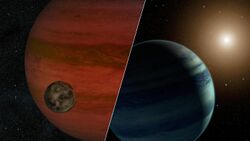Astronomy:MOA-2011-BLG-262L
From HandWiki
Short description: Astronomical object
| Observation data Equinox J2000.0]] (ICRS) | |
|---|---|
| Constellation | Sagittarius[1] |
| Right ascension | 18h 00m 23.48s[2] |
| Declination | −31° 14′ 42.93″[2] |
| Astrometry | |
| Distance | ~1,800 or ~23,000 ly (~560 or ~7,200[2] pc) |
| Details[2] | |
| Mass | 0.11+0.21 −0.06 or 0.003 M☉ |
| Mass | 115.2327 or 3.6+2.0 −1.7 MJup |
| Database references | |
| SIMBAD | data |
MOA-2011-BLG-262L is an astronomical object of uncertain nature with an orbiting companion, detected through the gravitational microlensing event MOA-2011-BLG-262 in the constellation Sagittarius. Two different models fit the observation equally well - an object of ~3.2 Jupiter mass, likely a rogue planet, at a distance of about 0.56 kiloparsecs (1,800 light-years) and orbited by a ~0.47 M⊕ exomoon; or an object of ~0.11 M☉, likely a red dwarf star, at a distance of about 7.2 kiloparsecs (23,000 light-years) in the galactic bulge, and orbited by a ~17 M⊕ planet. The discovery team considers the latter scenario to be more likely, but the former is a better fit.[2][3]
Planetary system
| Companion (in order from star) |
Mass | Semimajor axis (AU) |
Orbital period (days) |
Eccentricity | Inclination | Radius |
|---|---|---|---|---|---|---|
| b | 18+28 −10 or 0.54+0.30 −0.19 M⊕ |
0.84+0.25 −0.14 or 0.13+0.06 −0.04 |
— | — | — | — |
References
- ↑ "Finding the constellation which contains given sky coordinates". 2 August 2008. http://djm.cc/constellation.html.
- ↑ 2.0 2.1 2.2 2.3 2.4 2.5 Bennett, D.P. et al. (13 December 2013). "A Sub-Earth-Mass Moon Orbiting a Gas Giant Primary or a High Velocity Planetary System in the Galactic Bulge". The Astrophysical Journal 785 (2): 155. doi:10.1088/0004-637X/785/2/155. Bibcode: 2014ApJ...785..155B.
- ↑ Clavin, Whitney (10 April 2014). "Faraway Moon or Faint Star? Possible Exomoon Found". NASA. https://www.jpl.nasa.gov/news/faraway-moon-or-faint-star-possible-exomoon-found.
 |





